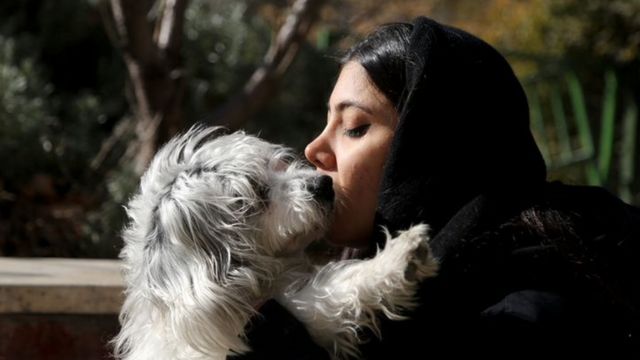Iran: Having pets could soon land you in jail
- By Ali Hamedani
- BBC World Service

Photo copyright, Getty Images
The new legislation could have dramatic consequences for pet ownership in Iran.
“He looks at me with his beautiful innocent eyes. He asks me to take him for a ride, but I don’t dare. They will arrest us.”
Mahsa, a dog owner from Tehran, refers to a new wave of arrests of pet owners and the seizure of their animals in the city.
Police in the Iranian capital recently announced that walking dogs in city parks is a “crime”.
This ban was justified as a measure to “protect public safety”.
Meanwhile, after months of debate, Iran’s parliament may soon pass a bill titled “Protection of Public Rights Against Animals,” which will broadly restrict pet ownership.
Fines
Under the terms of the new bill, pet ownership will be subject to a permit issued by a special committee. The law also provides for a minimum fine of about $800 for the “importation, buying and selling, transporting and possession” of a range of animals, including pets such as cats, turtles and rabbits.
“The debates on this bill started more than a decade ago when a group of Iranian lawmakers tried to push through a law to confiscate all dogs and either give them to zoos or leave them in deserts,” said Dr Payam Mohebi, president of the Iranian Veterinary Association. Association, and opponent of the bill, he told the BBC.
“Over the years, they’ve changed the situation several times and even discussed corporal punishment for dog owners. But their plan has come to nothing,” adds Dr. Mohebi.
Photo copyright, Courtesy of Dr. Payam Mohebi
Dr Payam Mohebi, president of the Veterinary Association of Iran, openly opposes the new bill.
A symbol of Iranian urban life
Keeping dogs has always been common in rural Iran, but these animals have also become a symbol of urban life in the 20th century.
Iran was one of the first countries in the Middle East to pass animal welfare laws, in 1948, and the government funded the first institution to promote animal rights. Even the country’s royal family had their dogs.
But the Islamic revolution of 1979 changed many aspects of the lives of Iranian citizens and dogs.
Photo copyright, Collection of the royal family of Iran
Dogs became a symbol of urban life in Iran during the 20th century and even the country’s royal family kept them.
These animals are considered unclean in Islamic tradition. In the eyes of the new regime, dogs have also become a symbol of “Westernization” that the authorities are trying to curb.
“There hasn’t been strong regulation of dog ownership,” Dr Ashkan Shemirani, a veterinarian in Tehran, told the BBC.
“Police forces arrest people for walking their dogs or even transporting them in cars, based on their interpretation of what could be seen as symbols of Westernization.”
Dog prisons
“They even set up a prison for animals and we’ve heard a lot of horror stories about this place,” he adds.
Photo copyright, Getty Images
Dogs are considered unclean animals in Islamic tradition and some see them as a symbol of “Westernization”.
“The animals were kept in open areas for many days without adequate food and water, while the owners of the dogs faced all sorts of legal problems.”
Iran’s economic woes after years of Western sanctions also played a role in the new bill. Authorities have banned pet food imports for more than three years in a bid to preserve the country’s foreign exchange reserves.
In a landscape dominated by foreign brands, this meant an increase in prices, especially after the establishment of a clandestine market.
“We are very dependent on people smuggling food,” the owner of a veterinary clinic in the city of Mashhad told the BBC.
My job, walking the dogs in Lagos
“Prices are now five times higher than they were a few months ago.”
The owner of the business says the locally produced pet food is not up to standard.
“The quality is very poor. The factories use cheap meat or fish, even expired ingredients.”
Cat disorder
But the new law isn’t just for dogs. Cats are also in a list of animals – even crocodiles are mentioned.
Iran is known to be the birthplace of Persian cats, one of the most famous breeds in the world.
The bill could create a paradoxical situation where Persian cats, which originated in Iran, could be banned.
“Can you believe that Persian cats are now not safe in their home country?” a Tehran vet told the BBC.
“There is no logic behind this law. The hardliners want to show people their iron fist,” they add.
Dr Mohebi, president of the Iranian Veterinary Association, calls the proposed law “embarrassing”.
“If Parliament passes the bill, future generations will remember us as people who banned dogs because they are dogs and cats because they are cats.”
Pet owners like Masha are genuinely concerned about the future of their pets.
“I won’t dare ask permission for my ‘son,'” she said.
“What if they refuse my request? I can’t leave it on the street.”


Commentaires
Enregistrer un commentaire